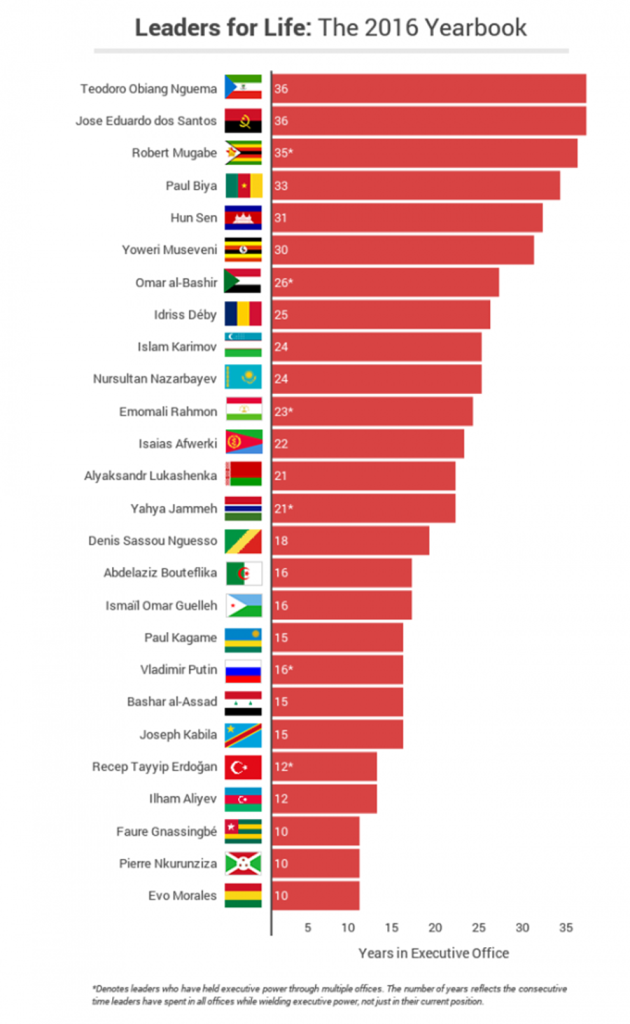 Excluding hereditary monarchies, there are close to 40 countries around the world in which the national leader has been in power for 10 or more years, writes Freedom House analyst Elen Aghekyan. A small number of rulers stay in office by simply ignoring the letter or spirit of the law.
Excluding hereditary monarchies, there are close to 40 countries around the world in which the national leader has been in power for 10 or more years, writes Freedom House analyst Elen Aghekyan. A small number of rulers stay in office by simply ignoring the letter or spirit of the law.
However, the key to success for most long-ruling strongmen has been the abuse of democratic processes, and they have developed a number of tactics in this regard:

Resetting the clock: Some veteran leaders have evaded term limits by arguing that the restrictions in new constitutions do not apply retroactively. Teodoro Obiang Nguema Mbasogo, president of Equatorial Guinea for 36 years and Africa’s longest-serving head of state, intends to run in the 2016 election despite a two-term limit set by the country’s 2011 constitution. Angola’s Jose Eduardo dos Santos, who rose to the presidency a month after Obiang, repeatedly postponed elections and then changed the rules of the game in 2010 through a new constitution, under which the presidency automatically goes to the leader of the strongest party in the legislature—also with a two-term limit.
The legislative assist: Cameroon’s Paul Biya, in the presidential seat for more than 33 years, successfully removed term limits in 2008 with the approval of the parliament, where his People’s Democratic Movement enjoyed an overwhelming majority. Nursultan Nazarbayev, president of Kazakhstan for over 24 years, followed a similar path in 2007, using a loyalist legislature to push through constitutional amendments that exempted him—and only him, as the first president of independent Kazakhstan—from a two-term limit. Others who employed such methods include Uganda’s Yoweri Museveni, Algeria’s Abdelaziz Bouteflika, and Djibouti’s Ismaïl Guelleh. Togo’s Faure Gnassingbé, now serving his third term, benefited from a similar move by his father and predecessor in 2002.
The art of the referendum: Other aspiring leaders for life have turned to referendums—rigged if necessary—to extend their rule. In Chad, a 2009 referendum abolished term limits amid allegations of widespread fraud, clearing the way for President Idriss Deby to seek reelection. Similar scenarios have unfolded in Azerbaijan and Belarus, while in The Gambia, a hastily approved constitution simply omitted mention of term limits. (Gambian president Yahya Jammeh has said that he would rule for “one billion years” if God wills it, and that only God can set term limits.) The referendum path remains popular. In 2015, President Denis Sassou Nguesso of the Republic of Congo also used a plebiscite to clear the way for an unlimited number of terms. And after Bolivians head to the polls this February, voters in Tajikistan will follow suit in May.
The kitchen-sink approach: In 2015, Rwanda’s Paul Kagame used all of these tactics to significantly extend his presidential eligibility. The parliament, dominated by his party, changed the constitution to cut presidential terms from seven to five years, retaining a two-term limit. However, supposedly by popular demand, this would take effect only after the current president completes an optional third seven-year term. A referendum was then held to approve the changes, which passed with more than 98 percent of the vote, according to official results. The revisions mean that Kagame, up for reelection in 2017, could remain in office until 2034.
High costs and an uncertain future: While many autocrats have found ways to entrench themselves in office, there are few examples to follow for making such a personalized system sustainable. Some leaders have groomed successors—sons, wives, trusted lieutenants. But the destructive effects of one-man rule on an electoral republic often leave little in the way of effective state institutions to guarantee continuity or long-term stability.
Elen Aghekyan is Senior Research Assistant, Freedom in the World and Freedom of the Press.
RTWT, 12.02.2016




